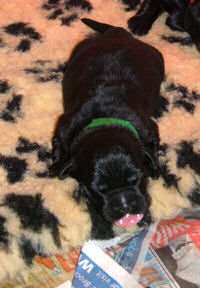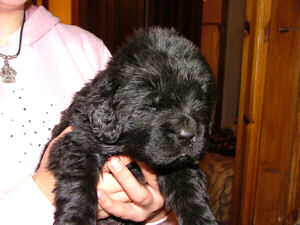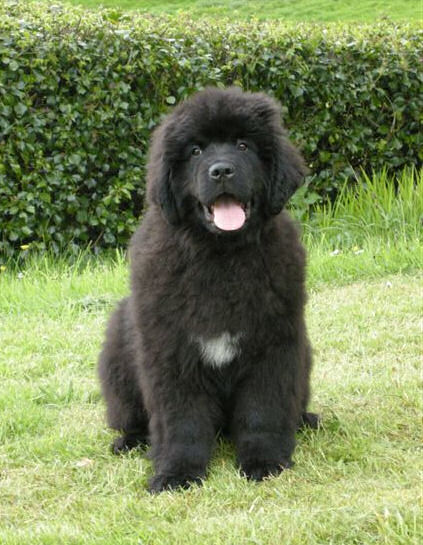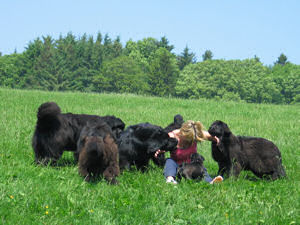Foreword
Puppies are beautiful (God made them that way) so we fall in love with them. Newfoundland puppies are especially endearing but puppies don't stay puppies for very long.
If you are not totally committed and prepared for everything that comes with raising a Newfoundland puppy and caring for an adult dog, you WILL have problems.
Please consider VERY carefully:
- Size - Newfoundlands are BIG and BULKY. A large room seems a lot smaller when shared with a newfie! They take up a lot of space in your home and in your car ... you may even need to get a bigger car.
- Weight - According to the Breed Standard, adult males weigh an average of 64-69 kgs (140-150 lbs) and adult females 50-54.5 kgs (110-120 lbs) - that is HEAVY, especially when they want to sit on your feet, lie on your lap or lean their weight against your leg. An 8 or 10 stone dog running into you, even accidentally, is likely to flatten you.
- Feeding - Especially when growing, Newfoundlands need a substantial but controlled amount of food of high quality, that is a costly proposition. As an adult, the feeding amount is less than you might expect but again quality of food is important.
To avoid digestive problems such as 'Bloat' you will always have to feed two smaller meals a day, you can't get away with one large meal.
- Exercise - Young Newfoundlands need enough exercise to keep them lean and healthy, but not so much that their soft growing bones, joints, and ligaments become over-stressed and damaged. Adult Newfoundlands need more exercise to keep them in shape, but great care needs to be taken in hot or humid weather for fear of overheating.
The proper amount of exercise can be difficult to regulate in giant breeds.
Since you have to minimize their exercise, young Newfoundlands can be very boisterous. You need to substitute the limited exercise with extra mental stimulation, companionship and supervision.
Otherwise, left to their own devices, young Newfoundlands can become bored and destructive.
- Coat - With a double coat, and lots of it, Newfoundlands are among the heaviest shedders of all breeds. Be warned, you will find hair and fluffy fur all over your clothing, upholstery, carpeting, under your furniture, on your countertops - even in your food. Frequent vacuuming will become a way of life so make sure you're REALLY up for this.
- Grooming - Regular, thorough grooming is essential to prevent matting and keep their coats in good condition. You WILL need to have the time to devote to grooming. Bathing a newfie is a major undertaking too and you are likely to have to do that more often than you think, given the Newfoundland's love of getting wet and muddy. A 'blaster' is an essential piece of equipment.
- Slobber - If you find slobber or drool disgusting and cannot accept or handle it, a Newfoundland is probably not the breed for you.
Most people are unprepared for how just how much Newfoundlands slobber and drool, especially after eating or drinking.
When they shake their heads, you will literally be toweling saliva and slime off your clothes, furniture, and walls. Keeping a 'slobber cloth' close at hand is probably going to have to become second nature.
- Expense - Because they are a giant breed, everything about Newfoundlands is much more expensive than for a smaller dog.
Apart from the obvious cost of food, insurance is more expensive and worming treatments or other medications which are based on body weight are going to cost a lot more for a Newfoundland than a Chihuahua!
- Training - Is NOT optional! If you can't control a dog the size (and strength) of a Newfoundland with voice or gentle but firm checks, there is going to be an accident or upset just waiting to happen.
Many Newfoundlands, particularly young males, are not pushovers to raise and train. Some can be willful and dominant (they want to be the boss) and will make you prove that you are the 'pack leader'. You must show them, through absolute consistency, that you mean what you say and you are the boss.
We strongly recommend that you you get your Newfoundland involved in obedience classes.
Because they are a Working breed, a working activity such as pulling a cart or swimming is highly recommended.
- Socialisation - Especially when a young puppy, a Newfoundland needs extensive exposure to people, places and to unusual sights and sounds.
Otherwise their natural caution can become shyness or suspiciousness, which is difficult to live with. Be prepared to invest the time and effort which proper socialisation requires.
- Companionship - Newfoundlands are one of the most devoted of dog breeds, it's one of the great attractions of newfies. They want and need to be with you and because of that they are not a suitable breed to be left alone for any length of time. If you work all day and your dog is going to be left alone, a Newfoundland is not the breed for you.
... if you are still reading this
A Newfoundland will be:
- Devoted and loyal
- A wonderful companion
- Receptive to training
- Steady-tempered with everyone
- A willing worker
- An admired animal
- A love of your life!
Conditions
Before parting with a Sandbears puppy we will quite possibly carry out a home visit or make enquiries to ensure that it is going to a suitable home. That doesn't mean the home has to be spotlessly clean or 'posh', in fact if it was it isn't likely to stay that way for long with a newfie puppy about!
Home checks are only done because we want to make sure that the puppy has an enclosed suitable garden and a genuine caring home.
Prospective purchasers should know that endorsements are placed on the pedigrees of ALL puppies (without exception) which prevent their export or their progeny being eligable for KC registration. This is written into a Contract signed by both parties and is done to prevent improper breeding or the export of our Newfoundlands.
It is not intended to be restrictive as the breeding endorsement can and usually will be lifted where evidence of the appropriate good health checks is produced prior to any breeding.
|

Not so big when newly born
- but just wait!

At three weeks
- already more than a handful

Puppies grow FAST

Adult Newfoundlands are BIG
- and still want to sit on your lap!
Leadership & Training
Dogs do not believe in social equality. They live in a social hierarchy led by a pack-leader (Alpha). The alpha dog is generally benevolent, affectionate, and non-bullying towards his subordinates; but there is never any doubt in his mind or in theirs that the alpha is the boss and makes the rules.
Whatever the breed, if you do not assume the leadership, the dog will do so sooner or later and with more or less unpleasant consequences for the abdicating owner. Like the untrained dog, the pack-leader dog makes his own rules and enforces them against other members of the household by means of a dominant physical posture and a hard-eyed stare, followed by a snarl, then a knockdown blow or a bite.
Breeds differ in tendencies towards social dominance; and individuals within a breed differ considerably.
You do not have to have the personality or mannerisms of a Marine boot camp Sergeant, but you do have to have the calm, quiet self-assurance and self-assertion of the successful parent ("Because I'm your mother, that's why.") or successful grade-school teacher.
If you think you might have difficulty asserting yourself calmly and confidently to exercise leadership, then choose a breed known for its socially subordinate disposition, such as a Golden Retriever or a Shetland Sheepdog AND be sure to ask the breeder to select one of the more submissive pups in the litter for you.
If the whole idea of "being the boss" frightens or repels you, don't get a dog at all. Cats don't expect leadership. A gerbil or hamster, or fish doesn't need leadership or household rules. Leadership and training are inextricably intertwined - leadership personality enables you to train your dog, and being trained by you reinforces your dog's perception of you as the alpha.
Choose an adult instead?
There are adult Newfoundlands who have already proven themselves NOT to have negative
characteristics - you can find such an adult.
Please contact us if you would prefer to consider an adult as occasionally, due to unforeseen circumstances,
a re-home may be available.
The UK Breed Clubs have welfare and re-homing programs. You can contact them via
their web sites, links to which appear on our Breed Clubs links page.
|





